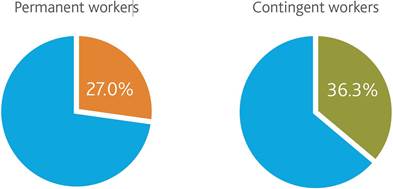- 36.3% of CV checks on contingent workers show inaccuracies against 27% for permanent workers
- Temporary workers account for approximately 10 percent of an organisation’s workforce
A new report from background screening company First Advantage reveals that more than a third (36.3%) of CV checks on contingent workers show inaccuracies. The report covers checks carried out in EMEA between January 2011 and June 2014.
‘Contingent workers’ covers contractors, consultants, temps, seasonal workers and external staff, who account for approximately 10 percent of an organisation’s workforce – a figure that is set to rise.
Inaccuracies on contingent worker CVs were uncovered in almost half (48.1%) of all education history checks, more than a third (35.6%) of employment history checks and more than a fifth (22%) of professional checks (qualifications, licenses and memberships). Although lower, permanent worker discrepancy rates are still worryingly high, with more than a quarter (27%) of CV checks revealing inaccuracies.

Traci Canning, Senior Vice President and Managing Director of First Advantage in EMEA, comments: ““Contingent workers” are increasingly viewed as an extension of an organisation’s permanent workforce, with many carrying out strategic roles in senior positions. However, many companies either screen them less thoroughly than permanent employees or, in some cases, not at all. The reality is that contingent staff often work in the same areas and access the same material as permanent staff, and therefore present similar risks.
Canning continues: “Our clients increasingly appreciate the need to screen consistently based on level and nature of a particular role, rather than the arbitrary matter of whether it’s permanent or temporary. This is strongly supported by our data, which shows that checks on contingent workers are more likely to uncover inaccuracies than those of permanent employees.”



